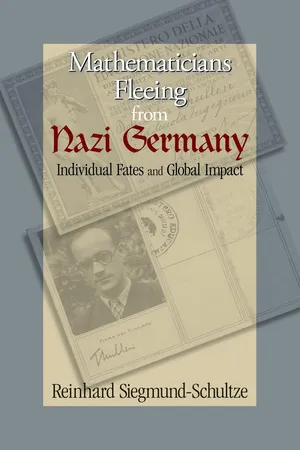
Mathematicians Fleeing from Nazi Germany
Individual Fates and Global Impact
Reinhard Siegmund-Schultze
- 504 Seiten
- English
- ePUB (handyfreundlich)
- Über iOS und Android verfügbar
Mathematicians Fleeing from Nazi Germany
Individual Fates and Global Impact
Reinhard Siegmund-Schultze
Über dieses Buch
The emigration of mathematicians from Europe during the Nazi era signaled an irrevocable and important historical shift for the international mathematics world. Mathematicians Fleeing from Nazi Germany is the first thoroughly documented account of this exodus. In this greatly expanded translation of the 1998 German edition, Reinhard Siegmund-Schultze describes the flight of more than 140 mathematicians, their reasons for leaving, the political and economic issues involved, the reception of these emigrants by various countries, and the emigrants' continuing contributions to mathematics. The influx of these brilliant thinkers to other nations profoundly reconfigured the mathematics world and vaulted the United States into a new leadership role in mathematics research.
Based on archival sources that have never been examined before, the book discusses the preeminent emigrant mathematicians of the period, including Emmy Noether, John von Neumann, Hermann Weyl, and many others. The author explores the mechanisms of the expulsion of mathematicians from Germany, the emigrants' acculturation to their new host countries, and the fates of those mathematicians forced to stay behind. The book reveals the alienation and solidarity of the emigrants, and investigates the global development of mathematics as a consequence of their radical migration.
An in-depth yet accessible look at mathematics both as a scientific enterprise and human endeavor, Mathematicians Fleeing from Nazi Germany provides a vivid picture of a critical chapter in the history of international science.
Häufig gestellte Fragen
Information
Inhaltsverzeichnis
- Cover
- Title Page
- Copyright
- Contents
- Figures and Tables
- Preface
- Chapter 1 - The Terms “German-Speaking Mathematician,” “Forced,” and “Voluntary Emigration”
- Chapter 2 - The Notion of “Mathematician” Plus Quantitative Figures on Persecution
- Chapter 3 - Early Emigration
- Chapter 4 - Pretexts, Forms, and the Extent of Emigration and Persecution
- Chapter 5 - Obstacles to Emigration out of Germany after 1933, Failed Escape, and Death
- Chapter 6 - Alternative (Non-American) Host Countries
- Chapter 7 - Diminishing Ties with Germany and Self-Image of the Refugees
- Chapter 8 - The American Reaction to Immigration Help and Xenophobia
- Chapter 9 - Acculturation, Political Adation, and the American Entrance into the War
- Chapter 10 - The Impact of Immigration on American Mathematics
- Chapter 11 - Epilogue: The Postwar Relationship of German and American Mathematicians
- Appendix 1 - Lists of Emigrated (after 1933), Murdered, and Otherwise Persecuted German-Speaking Mathematicians (as of 2008)
- Appendix 2 - Excerpt from a Letter by George David Birkhoff from Paris (1928) to His Colleague-Mathematicians at Harvard Concerning the Possibility of or Desirability to Hire Foreigners
- Appendix 3.1 - Report Compiled by Harald Bohr “Together with Different German Friends” in May 1933 Concerning the Present Conditions in German Universities, in Particular with Regard to Mathematics and Theoretical Physics
- Appendix 3.2 - Translation of a Letter from Professor Karl Löwner of the University of Prague to Professor Louis L. Silverman (Dartmouth College) Dated August 2, 1933
- Appendix 3.3 - Richard von Mises’s “Position toward the Events of Our Time” in November 1933
- Appendix 3.4 - Report by Artur Rosenthal (Heidelberg) from June 1935 on the Boycott on His and Heinrich Liebmann’s Mathematical Courses
- Appendix 3.5 - Max Pinl—Later Author of the Pioneering Reports (1969–72) on Mathematical Refugees—in a Letter to Hermann Weyl on the Situation in Czechoslovakia Immediately after the Munich Dictate of September 29, 1938
- Appendix 4.1 - A Letter by Emmy Noether of January 1935 to the Emergency Committee in New York Regarding Her Scientific and Political Interests during Emigration
- Appendix 4.2 - Richard Courant’s Resignation from the German Mathematicians’ Association DMV in 1935
- Appendix 4.3 - Von Mises in His Diary about His Second Emigration, from Turkey to the USA, in 1939
- Appendix 4.4 - Hermann Weyl to Harlow Shapley on June 5, 1943, Concerning the Problems of the Immigrant from: Göttingen, Felix Bernstein
- Appendix 5.1 - Richard Courant in October 1945 to the American Authorities Who Were Responsible for German Scientific Reparation
- Appendix 5.2 - Max Dehn’s Refusal to Rejoin the German Mathematicians’ Association DMV in 1948
- Appendix 6 - Memoirs for My Children (1933/1988) Peter Thullen
- Archives, Unprinted Sources, and Their Abbreviations
- References
- Photographs Index and Credits
- Subject Index
- Name Index